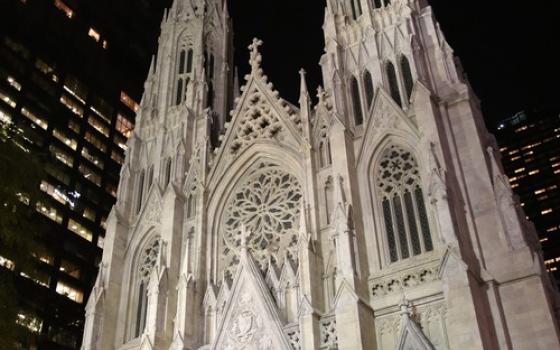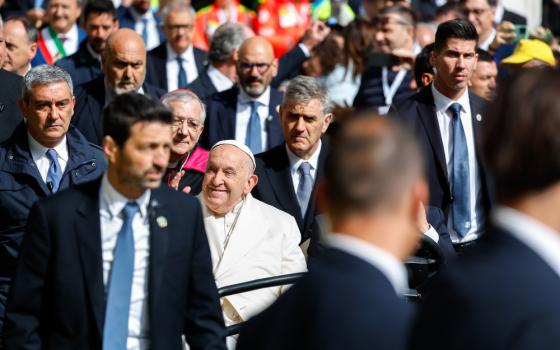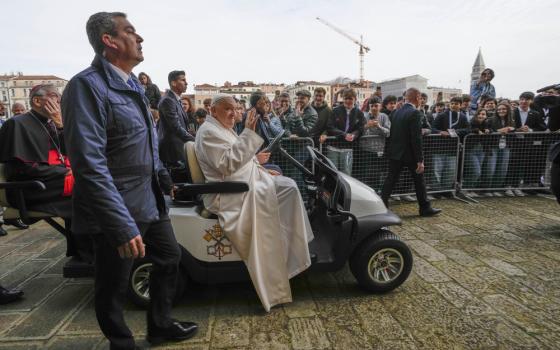Dear Fellow Catholic Voters:
Our national political scene has risen to its climax these past few days: the Republican National Convention in Cleveland came and went, and the Democratic National Convention is wrapping up tonight in Philadelphia. As a contemplative, I am resisting writing a cute 140-character synthesis of world and country affairs simply to get a bunch of likes or loves or hahas or wows. I owe you and your communities, our candidates and their families, those on the margins of our powerful nation and myself a little more than a superficial genuflection at single issues that do not align with my personal beliefs, reality or practice.
This letter is not meant to sway you to favor one candidate over another or move you to understanding one platform more deeply than another. Truthfully, you probably have already made many decisions: from whom to vote for to whether to vote at all, from tuning out of all of the political discourse to vehemently arguing for one side over another. You have probably made your decision already.
Consider the following to be a reminder of how to pay attention in order to do as Christ invites us and build the community of love, peace, compassion and mercy.
I realize that identifying as "Catholic" brings both insecurity and certainty, pride and bashfulness. Some people in our communion are referred to as "cafeteria Catholics," only picking what they like from the catechism, social teaching and tradition. Some are seen as "cultural Catholics" entrenched in the Catholic worldview but not intentionally choosing to pray in obligatory ways. Similarly, some are "cradle Catholics" who were born and raised Catholics and still participate in rituals of prayer and community in their neighborhoods all across the world. Our communion is understood to be contained in a big tent of belief and practice. Like the body is composed of several, differing parts that function for the whole, so, too, is our body, our communion with Christ. (1 Corinthians 12:26, Romans 12:4-8) Our universal communion is both a challenge and a hope.
Here is my top five list of how our shared Catholicism can and must shape the way we participate politically in our community:
1. Sacramental worldview: One of the best things about being Catholic is our understanding of sacrament, an outward sign instituted by Christ to give grace. We are embodied creatures, and these physical signs are confirmations of what the mystery of God invites us to come to know. From the seven sacraments that mark moments of commitment and blessing to the Catholic worldview of sacramentality and how the created world is imbued with grace, we understand that we are not alone in our decisions and in the ways we choose to live. In fact, God created us and labors on our behalf. We are invited to co-create with this God of generosity and life. Our human dignity is ours because we were first loved and given the grace of the Spirit to respond to God's gift with gratitude and service.
To be Catholic is to stand in a place of awe and wonder at God's creation and to continue to labor for the appreciation of all in every moment, in every situation.
2. The communion of saints: We understand that our life is not just about the limits of the years and days and hours we are on Earth, but our life is a life in communion with all the lives that have gone before us and all the lives that will go after us. This Sunday, we pray together especially companioned by St. Ignatius of Loyola, whose relationship with God produced much fruit for me and countless others who have been inspired and formed by his Spiritual Exercises.
From the list of American faithful that Pope Francis named during his speech to the the U.S. Congress about a year ago, he lifted up examples of President Abraham Lincoln; Dorothy Day, foundress of the Catholic Worker Movement; Rev. Dr. Martin Luther King, Jr.; and Trappist Monk, Thomas Merton. Each of these "saints" emerged as leaders in a time that demanded conviction of action, not just belief. We draw upon the stories of the saints to give us examples of how we are to translate our belief to action that connects us all to one another and builds up God's dream for the world.
To be Catholic, we continually ask what is it that we can glean from the powerful witness, practice, action of the people who have gone before us.
3. Liturgical life: Amidst the deteriorating fulfillment of the obligation to attend eucharistic liturgy each Sunday, we are rooted in the fact that our church's practice of thanksgiving is offered practically every moment, every minute of every day, anywhere around the world. This universal practice in a multitude of languages still only speaks one language of the heart: forgiveness, inspiration, connectedness and mission. If liturgy really is the work of the people, our prayer is a duty to cultivate a society that is practices forgiveness, relies on inspiration, acts in ways that connect us to one another and knows it is part of a mission, and is necessarily loving and along the way to something more loving.
To be Catholic is to recognize our own beloved sinfulness and be moved by the relationship with Christ to try to attempt to bring that spirit of healing, wholeness and insight into our broken world.
4. Catholic social thought: Often referred to as our best-kept secret, Catholic social teaching developed out of a society's need to be grounded in a moral vision of equity, fairness and care. Our relationship with God has a social dimension. A series of papal reflections on our modern world have been synthesized into a few major themes that continue to guide our efforts to achieving the common good. I take special note that we are not trying to achieve unity as in singularity, but common as connected, perhaps unifying in difference and diversity. When forced to make a moral judgment on the ways we are called to interact lovingly with one another, we are reminded hold central the values of life and dignity of the human person; call to family, community and participation; dignity of work and rights of workers; global solidarity; preferential option for the poor and the vulnerable; promotion of peace and disarmament; and care for God's creation.
We deepen our reflection on the invitation to uphold the common good in St. John XXIII's Pacem in Terris. The Center of Concern's online resource EducationForJustice.org publishes summary statements of each papal encyclical and identifies the characteristics of the common good as the following: Human person must be considered (#55); all members of the state share in common good (#56); more attention must be given to the less fortunate members of society (#56); and state must promote material and spiritual welfare of citizens (#57).
Our tradition has reflected on the role of government and subsidiarity (lowest level of governance possible) as we have considered Jesus' instruction to "repay to Caesar what belongs to Caesar and to God what belongs to God" (Matthew 22:16-21).
To be Catholic is to strive for the common good, to participate in our families and communities in a way that cares for our connectedness.
5. Formation of our conscience: Referencing both our tradition and our sacred Scripture can sometimes create an tension as we continue to imagine just what Jesus and his followers would do if in the same situation as we are today. Our catechism speaks about the primacy of our own conscience in this way, "Conscience is a judgment of reason whereby the human person recognizes the moral quality of a concrete act. ... [Every person] is obliged to follow faithfully what he [or she] knows to be just and right" (Catechism of the Catholic Church, no. 1778).
Just as our Jewish sisters and brothers were invited to understand that the loss of their Temple was simply a loss of a building, but really, God was wherever they were, we, too, are invited to learn at the feet of Christ and Christ's church and act as justly as we can.
Our conscience is a combined judgment of past experiences, lessons, insights, desires and truths that set us up for this next moment of discernment, decision and choice. The Book of James reminds us to "humbly welcome the word that has been planted in our hearts" (1:21). We are given the free will to contemplate what exactly it is to be loving towards God, one another and ourselves in times of joy and grief. We recall the very love that God has bestowed upon us and that no form of human indulgence can ever take away.
To be Catholic is to be curious and to bring our concerns to God and our communities in order to discern where and how best we are called to live into both the greatest commandment, to love God, self and one another (Mark 12:30-31), and the new commandment Jesus gave us before his death: "I give you a new commandment: Love one another. As I have loved you, so you also should love one another" (John 13:34),
So, there you have it. For more guidance, please continue to solicit support from your own communities of faith in addition to the USCCB's series on faithful citizenship.
If there were a slogan I would like to use as a citizen of the United States and of our global society, it would read, "I'm with Christ."
Blessings on the ways you choose to participate in your neighborhoods during this time of political, economic and social strife.
[Jocelyn A. Sideco is a retreat leader, spiritual director and innovative minister who specializes in mission-centered ministry. She teaches bioethics, feminist theology, Christian sexuality, and Christian Scriptures at Bishop O'Dowd High School in Oakland, Calif. Visit her online ecumenical ministry, In Good Company, at contemplativecompanions.org. Her email address is jocelyn@ingoodcompany.net.co.]
Editor's note: We can send you an email alert every time a Young Voices column is posted to NCRonline.org. Go to this page and follow directions: Email alert sign-up.




